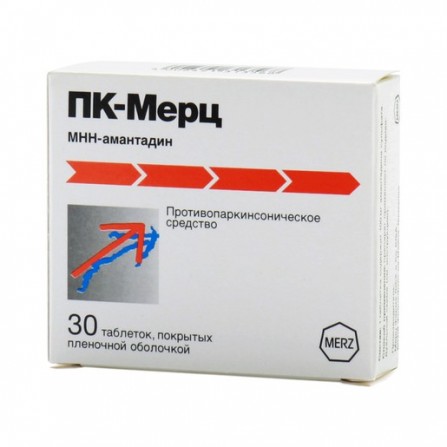PC-Mertz pills 100 mg 30 pcs
Condition: New product
976 Items
Rating:
Be the first to write a review!

More info
Active ingredients
Amantadine
Release form
Pills
Composition
Active ingredient: Amantadine (Amantadinum) Active ingredient concentration (mg): 100
Pharmacological effect
Glutamate N-methyl-D-aspartate receptor (NMDA receptor) blocker. Anti-Parkinsonian drug. Amantadine has an indirect agonistic effect on striaty dopamine receptors. It increases the extracellular concentration of dopamine through both the intensification of its production and the blockade of dopamine reuptake by presynaptic neurons. At therapeutic concentrations, amantadine slows down the production of acetylcholine and, thus, has an anticholinergic effect.
Pharmacokinetics
Absorption After taking a single dose, Cmax is reached in about 2-8 hours. After receiving amantadine sulfate at a dose of 100 mg, Cmax is 0.15 μg / ml. The average plasma concentration of amantadine sulfate after intravenous infusion at a dose of 200 mg for 3 hours is 0.54 μl . At a dose of 200 mg / day, the average plasma concentration by the end of the 6th day of treatment is 0.76 μl. Distribution: Plasma protein binding is 67%. Gets through the BBB. Injection T1 / 2 - 10-30 hours, on average 10 hours. Excreted by the kidneys almost unchanged (90% of a single dose); a small amount - with feces. Dialysis is ineffective (about 5% for one procedure). The total clearance with a / in the introduction is 3.6 l / h.
Indications
PC-Mertz infusion solution (amantadine): Intensive primary treatment of severe and life-threatening cases of parkinsonism (in particular, akinetic crises). Temporary interruption of oral therapy. Loss of consciousness as a result of traumatic brain injury. Slowing out of anesthesia. amantadine): It is used in Parkinson’s disease and parkinsonism of various etiologies. The drug is effective against the triad of symptoms observed in parkinsonism (mainly in rigid and akinetic forms, less effect on hyperkinetic syndrome - tremor)
Contraindications
Glaucoma, prostate adenoma.Psychomotor agitation. State preddeliry and delirium, psychosis in history. Epilepsy, thyrotoxicosis, acute and chronic diseases of the liver and kidneys. Pregnancy (1 trimester) and the period of breastfeeding. Hypersensitivity to the drug.
Precautionary measures
Do not exceed the recommended dose. With caution, the drug should be prescribed for prostatic hyperplasia, angle-closure glaucoma, renal failure of varying severity (there is a risk of drug cumulation), agitation, delirium, CNS depression, exogenous psychosis (including a history), co-administration with memantine, triamterene / hydrochlorothiazide.
Use during pregnancy and lactation
The drug is contraindicated in pregnancy and lactation (breastfeeding).
Dosage and administration
Dosage regimen is individual. The drug is prescribed after a meal. Usually, treatment begins: In the first three days, 1 tablet per day, then increase this dose to 2 pills per day, with a further increase in dose by 1 tablet per week. In the case of a combined treatment of parkinsonism, it is necessary to determine the dose individually. The last dose is recommended to be taken in the afternoon before dinner. Elderly patients, in particular, patients suffering from a state of agitation and confusion, preddeliry and delirium, require a lower dosage.
Side effects
Mental disorders accompanied by visual hallucinations. Rarely - motor and mental excitement. Retention of urine in patients with prostate adenoma. Heart failure. Arrhythmia, tachycardia, nausea, dry mouth, dizziness, sleep disorder. Very rarely - the appearance of bluish color of the skin of the upper and lower extremities, a decrease in visual acuity.
Overdose
Symptoms: nausea, vomiting, tremor, ataxia, reduced visual acuity, lethargic condition, dysarthria, epileptic seizures, arrhythmia. Treatment: gastric lavage, taking activated charcoal. Symptomatic therapy is performed.
Interaction with other drugs
Concurrent use of amantadine and drugs that cause an increase in the QT interval, in particular: - Class I A antiarrhythmic drugs (for example, quinidine, disopyramide,procainamide) and class III (for example, amiodarone and sotalol); - antipsychotic drugs (for example, thioridazine, chlorpromazine, pimozide); - tricyclic and tetracyclic antidepressants (for example, amitriptyline); - antihistamines (for example, astemizol, terfenadine); antibiotics (for example, erythromycin, clarithromycin); - gyrase inhibitors (for example, sparfloxacin); - antifungals of the azole group; - other drugs (bedidine, halofantrine, co-trimoxazole, pentamidine, cisapride and bepridil). Simultaneous administration of diuretics agents that represent a combination of triamterene / hydrochlorothiazide can lead to an increase in plasma concentration of amantadine. When taken simultaneously with other anti-Parkinsonian drugs (levodopa, bromocriptine, memantine, trihexyphenidyl), it may be necessary to lower the dose of the simultaneously taken drug, or both, to avoid undesirable effects , in particular, psychotic reactions. Anticholinergics, sympathomimetics and memantine increase the side effects of amantadine .CNS stimulating agents (incl. psychostimulants), ethanol increases the risk of side effects of amantadine.
special instructions
Treatment with PC-Mertz can not be stopped suddenly, because this can lead to a worsening of the course of the disease. Patients with cardiovascular diseases should be under constant medical supervision when prescribing the PC-Mertz drug. Alcohol is contraindicated against the background of treatment. Influence on the ability to drive motor vehicles and control mechanismsWith caution, the drug should be used during work drivers of vehicles and people whose profession is associated with increased concentration of attention.




